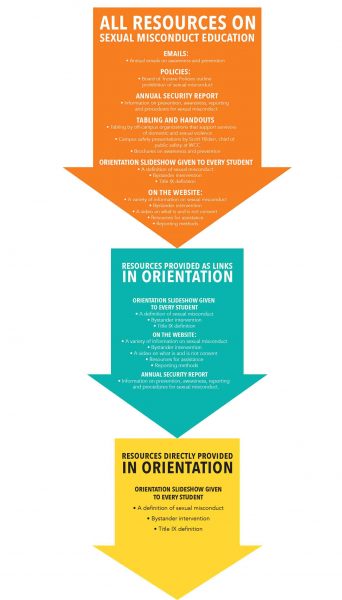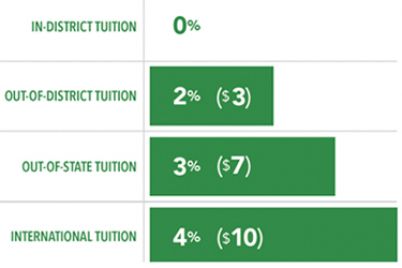by Suni Jo Roberts
Deputy Editor
Students and staff at WCC see “if we see something, we’ll say something” posters and brochures posted around offices and hallways on campus. What they may not always think about—or know—is that the subject, bystander intervention, must be addressed as part of sexual misconduct prevention and response under federal law.
This federal law—the Clery Act—along with Title IX and the Violence against Women Act are the institutional bedrock to addressing campus sexual assault. Together, these laws require schools to play a part in ending sexual violence through education and seeking justice for victims.
A provision of the Clery Act requires this education to be given to first-year college students. As a result, many schools take advantage of new student orientation to deliver the required prevention education.
WCC, too, provides information on sexual misconduct in its new student orientation.
While outreach and education efforts like emails, brochures, tabling events and website information rely on students choosing to engage, orientation is a situation where college officials have a captive audience. That makes it central to WCC’s effort to promote awareness and prevention of sexual misconduct.
Orientation
When new students first enroll at WCC, those with no prior college credit are required to complete two orientation sessions. (Students with at least 15 credit hours and a 2.0 GPA are only required to complete the online orientation). One session is online, the other is in-person with a “student ambassador.”
The in-person orientation session is called a “connect session.” It’s a tailored session with a trained student ambassador who helps newcomers navigate the WCC website and various campus resources, according to Kelly Psilidis, manager of new student programming.
During a connect session, students are given general crime-prevention and safety tips. They are shown the campus-safety website and learn how to make an anonymous report on the website. They’re shown the “if we see something, we’ll something” brochure on bystander education. In addition, new students are shown the campus-assistance program, said Psilidis. That program provides access counseling and clinical services.
These general crime and safety tips don’t cover sexual misconduct specifically and has lead some students to talk around the topic.
“Of course, I wish that there were people that understood, if that does happen to you and someone is doing that to you, that it’s not OK and you should say something about it,” said Kelli Gilbert, a WCC student ambassador who’s studying criminal justice. “I wish we could incorporate that somehow without sort of suggesting that that has happened to them … it’s really important because that happens around college campuses all the time.”
The other part of orientation, or the only part for those with previous college credit, is an online slideshow. The aspects of the slideshow that address sexual misconduct are bystander intervention, a link to the Annual Security Report, a statement on Title IX, a link to resources on sexual misconduct, contact information for WCC’s ombudsman and a link on reporting crime.
In both parts of orientation at WCC sexual misconduct information is addressed briefly, with more information available to students who actively engage in clicking on the links and seeking out the information.
One example of this is on the definition of consent, which is required by the Clery Act for schools to adopt policies on prevention. A student would have to click on the link in the slideshow and click on another link to find a video on consent.
Few assaults reported
Linda Blakey is the Title IX coordinator at WCC. Blakey, who serves as vice president of student and academic services, said she’s aware that every requirement may act as a barrier for students looking to come to WCC. The college’s compromise is making this information available but not required.
“I also want to be cognizant of not putting fear into students that thinking that they are coming to a campus where there is a high likelihood of being sexually assaulted on this campus because that is not the case,” said Blakey.
In fact, information in WCC’s annual Clery Report provides a sense of the low likelihood of sexual assault happening on campus.
That report discloses a variety of crimes, including sexual assaults, on campus and in the immediate vicinity of the college.
This information can be found in WCC’s Clery Report, which requires WCC to disclose all reports of sexual assaults on campus and on surrounding borders. One can get a sense of the low likelihood of sexual assaults happening on campus.
In 2016 five cases of sexual misconduct were reported. WCC broke those down into three reports of fondling and two reports of rape. The two reports of rape are in an inactive status, according to Scott Hilden, chief of public safety at WCC. The three reports of fondling were all handled internally through the college’s disciplinary process, according to Hilden.
In 2015 there was one report of rape which was turned over to the sheriff’s department to investigate as until now WCC did not have the capability of doing criminal investigations without a police force. In 2014 there were no reports of sexual misconduct.
A step further
WCC provides the necessary sexual misconduct prevention information required by federal law. However, there are other approaches that go further and provide practical implementation for students.
Oakland Community College is a non-residential school like WCC.
At OCC, students are offered a slideshow on Title IX titled “Student Empower Express” and can voluntarily earn a certificate of completion. That slideshow which gives students information on Title IX, the Clery Act and the Violence Against Women Act. The OCC slideshow includes definitions, quizzes, and scenarios which provide students with real-world examples on how to be an effective bystander, support friends, test their understanding of consent, and even a section on how to be a male ally. OCC officials could not be reached for information about participation.
Making personal safety a priority, chief of public safety Hilden has hosted a presentation on general safety topics including responding to an active shooter and sexual misconduct prevention information.
Hilden said he plans to do more in the future and advertise widely to attract more participants.
For some students, additional focus on sexual misconduct education would be welcomed.
“And no one really understands it, like, “Oh they are just being funny,” and they are really not,” said Gilbert on addressing sexual harassment on campus. “It’s important that they know that they are not. So, I do wish that there was something that we could do.”


